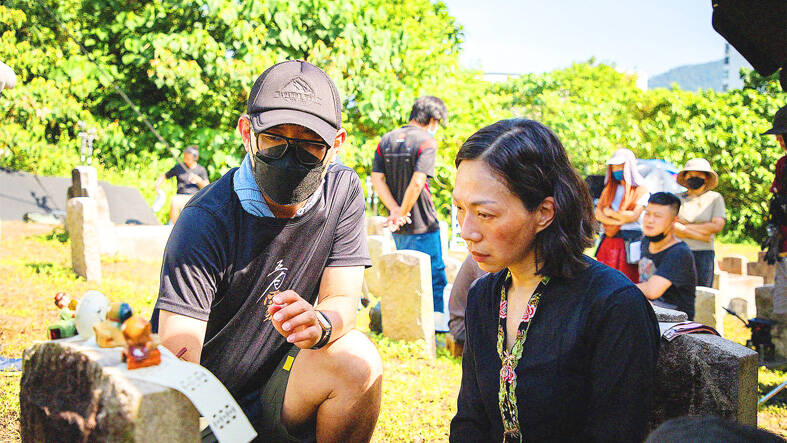It took director Chong Keat Aun (張吉安) nearly a decade to complete Snow in Midsummer (五月雪), a deft chronicle of Malaysia’s May 13 incident told through one woman’s search for her brother and father.
Although only his second feature, it led the field at yesterday’s Golden Horse Awards with nine nominations.
Chong said it had been a struggle to get people to share their memories of the intercommunal violence following the 1969 national election, known among the country’s ethnic Chinese community as “513.”

Photo courtesy of Swallow Wings Films via CNA
“My father, for example, would shut the conversation down if my mother or grandma even mentioned the topic,” Chong said in a recent media interview.
Although a “symbol of fear,” Chong said, “513” was more akin to an “invisible monster,” alluded to by adults to instill obedience in children.
“My grandma would tell me in Cantonese that if I continue to misbehave, that ‘513’ would come and get me,” he said.
Chong said it was only in high school that he became aware of the history behind the term.
Even then, relatives painted the gravity of what occurred in broad strokes.
“I remember when I started to vote in college in Kuala Lumpur, my parents would tell me to vote for a certain party so that I wouldn’t be targeted,” he said.
Chong added that he remembered his mother developing a habit of stocking their house with supplies before a major election and telling him to do the same when he moved out of the family home.
The Malaysian government says that only 196 people died in the May 13 incident, characterized by successive governments as a spontaneous outbreak of violence and a matter consigned to the past in the interest of racial harmony.
However, the official record remains contested, not least by those whose relatives seemingly vanished in the chaos.
Chong said that many of the registered missing ended up in mass graves marked “Unidentified Chinese.”
One such burial site, in a former leper colony in the town of Sungai Buloh on the outskirts of Kuala Lumpur, serves as a backdrop for the events in Snow in Midsummer.
“We started doing field interviews at Sungai Buloh in 2009, waiting until Tomb Sweeping Day to try and see if they [those visiting the graves] would share their story,” Chong said.
However, Chong said that most at Sungai Buloh were reluctant to share their stories, conscious of the lingering societal tensions and fearful violence might once again erupt.
Eventually, Chong and his team convinced 14 people to give personal accounts of the events of 1969, almost all of whom were women.
“It is conversations between women that family stories are often passed down from, as they, unlike men, are also not afraid to share their feelings and observations,” he said.
Chong said the sensitive subject matter prompted his producers to discourage him from making Snow in Midsummer.
Harder yet was the process of casting and subsequently convincing actors to stay on board, the director said.
“We wanted to have all 14 women appear at the end of the film, but actresses backed out,” Chong said.
“An unfortunate example is the actress who was originally cast to play young Ah Eng [the protagonist], the older version of whom is played by main actress Wan Fang (萬芳). After we put the young actress through acting classes, she had to quit five days before we started shooting because her grandfather, a public servant, found the script and was furious,” he said.
In the end, Chong himself had to condense characters and recycle actors.
He said he is driven by wanting to face history and facts and present them fearlessly so that wounds can be addressed, allowing forgiveness and progress to be cultivated.
“I think it is important that someone needs to take the first step,” he said. “Otherwise it will be something that no one will talk about. Then, no lesson or progress will be made, not for the government or Malaysia’s film industry.”

The inspection equipment and data transmission system for new robotic dogs that Taipei is planning to use for sidewalk patrols were developed by a Taiwanese company, the city’s New Construction Office said today, dismissing concerns that the China-made robots could pose a security risk. The city is bringing in smart robotic dogs to help with sidewalk inspections, Taipei Deputy Mayor Lee Ssu-chuan (李四川) said on Facebook. Equipped with a panoramic surveillance system, the robots would be able to automatically flag problems and easily navigate narrow sidewalks, making inspections faster and more accurate, Lee said. By collecting more accurate data, they would help Taipei

STATS: Taiwan’s average life expectancy of 80.77 years was lower than that of Japan, Singapore and South Korea, but higher than in China, Malaysia and Indonesia Taiwan’s average life expectancy last year increased to 80.77 years, but was still not back to its pre-COVID-19 pandemic peak of 81.32 years in 2020, the Ministry of the Interior said yesterday. The average life expectancy last year increased the 0.54 years from 2023, the ministry said in a statement. For men and women, the average life expectancy last year was 77.42 years and 84.30 years respectively, up 0.48 years and 0.56 years from the previous year. Taiwan’s average life expectancy peaked at 81.32 years in 2020, as the nation was relatively unaffected by the pandemic that year. The metric

TAKING STOCK: The USMC is rebuilding a once-abandoned airfield in Palau to support large-scale ground operations as China’s missile range grows, Naval News reported The US Marine Corps (USMC) is considering new sites for stockpiling equipment in the West Pacific to harden military supply chains and enhance mobility across the Indo-Pacific region, US-based Naval News reported on Saturday. The proposed sites in Palau — one of Taiwan’s diplomatic allies — and Australia would enable a “rapid standup of stored equipment within a year” of the program’s approval, the report said, citing documents published by the USMC last month. In Palau, the service is rebuilding a formerly abandoned World War II-era airfield and establishing ancillary structures to support large-scale ground operations “as China’s missile range and magazine

Passengers on Taiwan High Speed Rail (THSR) will be required to use headphones and make phone calls in gangways under new “quiet travel” rules starting Sept. 22. THSR Chairman Shih Che (史哲) told media that THSR will run a three-month promotional campaign to ensure widespread adoption of the new rules. Those repeatedly ignoring the guidance face the potential termination of their transport contract, which can result in them getting escorted off the train, according to THSR. Shih shared his hope to cultivate an environment conducive to rest and reading for the train’s passengers, stating that these changes aim to “promote self-discipline” among passengers